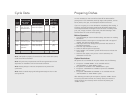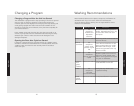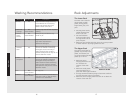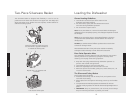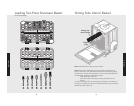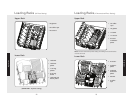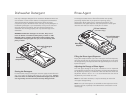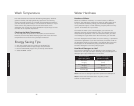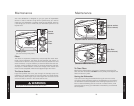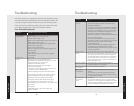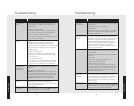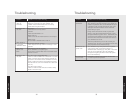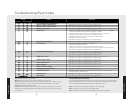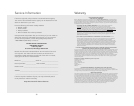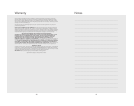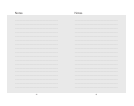
31
Product Care
30
Product Care
Troubleshooting
Poor wash results may not always be caused by the dishwasher. Please
review the following Troubleshooting Charts for possible remedies. You
may find the proper solution without having to call a service provider.
If the cycle buttons are flashing, please refer to the Fault Codes Chart
in the following pages of this manual for possible remedies.
Poor Dishwashing Results
Troubleshooting
Problem
Possible Cause and/or Remedy
The dishwasher
does not start
Door is ajar:
Make sure the door is closed securely.
“DELAY START” Option is On:
Make sure the “DELAY START” option is not turned on.
Water Supply is Disconnected:
Check that the water supply is connected properly
and the water is turned on.
Power Cord is Disconnected:
Make sure the power cord is properly plugged into
the wall socket.
Fuse is Blown:
Check your fuse box for a blown fuse or tripped
circuit breaker.
Spotting and
filming
Hard water:
Use the maximum recommended amount
(3 tablespoons) of dishwasher detergent. To remove
hard water spots, try a vinegar rinse:
• Wash and rinse load as usual.
• Remove all metal items from dishwasher.
• Do not add detergent.
• Pour two cups of vinegar into a bowl and set it on
the bottom rack of the dishwasher.
• Run the dishes through an entire wash program.
If the vinegar rinse doesn’t work, repeat the above
process substituting 1/4 cup citric acid crystals
(available at most drug stores) for the vinegar.
Wiping with a damp cloth should remove spots
from metal items. For sterling silver and silver
plated flatware, rub with a towel, or use a good cream
silver polish.
Filter system:
Check filter system to be sure it is clean and
properly installed.
Problem
Possible Cause and/or Remedy
Spotting and
filming
No rinse agent:
Does the rinse agent dispenser need to be filled?
Dishwasher detergent:
Use only the correct amount of dishwasher detergent
according to the hardness of the water and the wash
program you have selected. Do not use old or caked
detergent. Store the dishwasher detergent in a dry
place and in a closed container. Change the
dishwasher detergent if the result is still unsatisfactory.
Items not loaded properly:
Check that you loaded the items according to the
instructions on pages in this manual. Do not overload.
Make sure water can reach all soiled surfaces.
For hard water areas:
Adding additional products especially designed to
eliminate hard water deposits (such as Glisten,
Dishwasher Magic™ and Lemi Shine) may be used to
maintain performance.
Dishes are not
clean
Check that both wash arms can rotate freely and
that items do not obstruct the movement of the wash
arms. Lift the arms and make sure that no grains of
dirt retard the rotation of the wash arms. If necessary,
clear the obstruction, refit the arms, and check that
they rotate freely. Be sure a utensil or handle has not
prevented their turning
Strainer blocked Check the strainer. Clean if necessary. Refer to
maintenance section in this manual.
Excessive foam in
the machine
Use only dishwasher detergent.
Marks and
discoloration
Aluminum utensils rubbing against items during
washing:
Be sure aluminum utensils, especially light weight
foil-type pans, do not touch dishes. To remove spots,
use a non-abrasive cleaner.
Small particles
deposited on
items
Detergent:
Use only fresh detergent. Store in a tightly closed
container in a cool dry place. Fill dispenser only when
ready to start the dishwasher. Use the recommended
amount of detergent, especially with hard water



